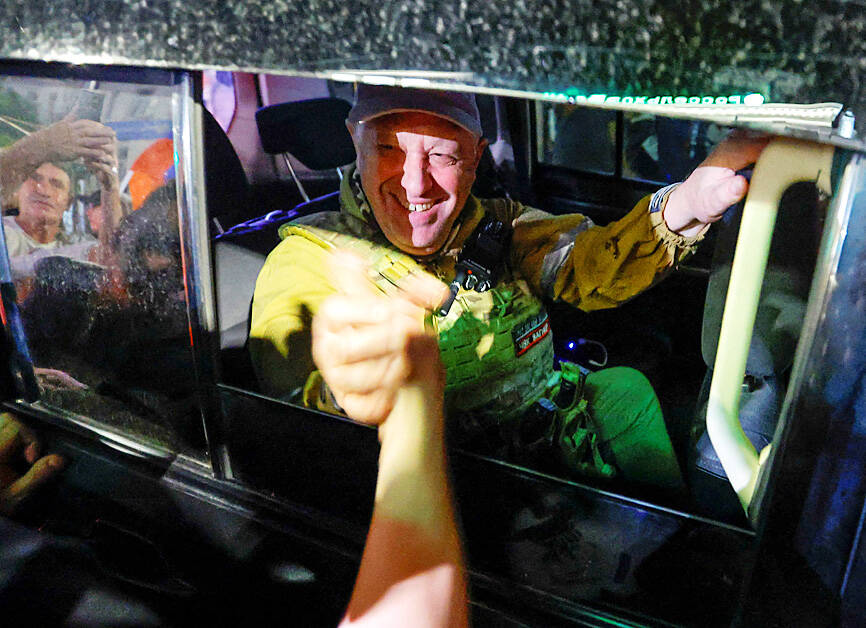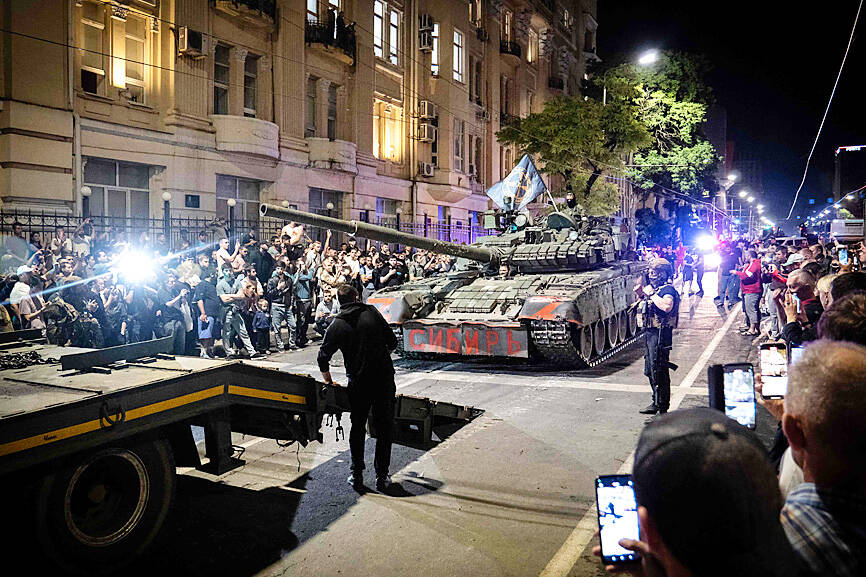Wagner Group mercenaries were returning to base yesterday as their leader agreed to go into exile after Russian President Vladimir Putin was forced to accept an amnesty deal.
The agreement appears to end the immediate threat that Yevgeny Prigozhin’s private army could storm Moscow, but analysts said Wagner’s revolt had exposed a fragility in Putin’s rule.
Security measures imposed under an “anti-terrorism operation” were still in place in Moscow, and Prigozhin’s exact whereabouts were unclear.

Photo: Reuters
However, his troops had left a military headquarters they had seized in southern Russia, and the governor of Voronezh on their route northward to Moscow said Wagner units were leaving the region and movement restrictions were being lifted.
They had also left the Lipetsk region in Southern Russia, the regional government said.
The long-standing feud between Prigozhin and military top brass over the conduct of the Russian operation in Ukraine boiled over on Saturday when Wagner forces seized the Russian base in Rostov-on-Don and embarked on a long advance toward Moscow.

Photo: AFP
Putin denounced the action as treason and vowed to punish the perpetrators, accusing them of pushing Russia to the brink of civil war, only to then accept a rapidly cobbled-together agreement to avert Moscow’s most serious security crisis in decades.
Within hours of Prigozhin’s about-face, the Kremlin announced he would leave for Belarus and Russia would not prosecute him or Wagner’s members.
It had been a dramatic day, with Putin warning against civil war and Moscow telling locals to stay off the streets.
The tide shifted suddenly when Prigozhin made the stunning announcement that his troops were “turning our columns around and going back to field camps.”
Prigozhin said he understood the importance of the moment and did not want to “spill Russian blood.”
By early yesterday, Wagner had pulled out of Rostov-on-Don, the regional governor said, but before they left dozens of residents were see cheering them and chanting: “Wagner, Wagner.”
Ukraine reveled in the chaos, stepping up its own counteroffensive against Russian forces in the country and mocking Putin’s apparent humiliation.
Analysts also said the deal had exposed weakness in the Russian president’s grip on power.
Belarusian President Alexander Lukashenko said he had negotiated the truce with Prigozhin. Moscow thanked him, but Lukashenko is usually seen as Putin’s junior partner.
The Institute for the Study of War, a Washington-based think tank, said Lukashenko’s direct role in negotiating the truce would be “humiliating to Putin.”
“The Kremlin now faces a deeply unstable equilibrium,” it said.
“The crisis of institutions and trust was not obvious to many in Russia and the West yesterday. Today, it is clear,” independent political analyst Konstantin Kalachev said.
“Yesterday’s call for unity made by representatives of the elites only confirmed this. Behind these is a crisis of institutions and fears for themselves,” he said.
He added that Russian leaders would be concerned by the sight of civilian onlookers applauding Wagner units in Rostov.
“Putin’s position is weakened,” he said. “Putin underestimated Prigozhin... He could have stopped this with a phone call to Prigozhin, but he did not.”

‘ABUSE OF POWER’: Lee Chun-yi allegedly used a Control Yuan vehicle to transport his dog to a pet grooming salon and take his wife to restaurants, media reports said Control Yuan Secretary-General Lee Chun-yi (李俊俋) resigned on Sunday night, admitting that he had misused a government vehicle, as reported by the media. Control Yuan Vice President Lee Hung-chun (李鴻鈞) yesterday apologized to the public over the issue. The watchdog body would follow up on similar accusations made by the Chinese Nationalist Party (KMT) and would investigate the alleged misuse of government vehicles by three other Control Yuan members: Su Li-chiung (蘇麗瓊), Lin Yu-jung (林郁容) and Wang Jung-chang (王榮璋), Lee Hung-chun said. Lee Chun-yi in a statement apologized for using a Control Yuan vehicle to transport his dog to a

BEIJING’S ‘PAWN’: ‘We, as Chinese, should never forget our roots, history, culture,’ Want Want Holdings general manager Tsai Wang-ting said at a summit in China The Mainland Affairs Council (MAC) yesterday condemned Want Want China Times Media Group (旺旺中時媒體集團) for making comments at the Cross-Strait Chinese Culture Summit that it said have damaged Taiwan’s sovereignty, adding that it would investigate if the group had colluded with China in the matter and contravened cross-strait regulations. The council issued a statement after Want Want Holdings (旺旺集團有限公司) general manager Tsai Wang-ting (蔡旺庭), the third son of the group’s founder, Tsai Eng-meng (蔡衍明), said at the summit last week that the group originated in “Chinese Taiwan,” and has developed and prospered in “the motherland.” “We, as Chinese, should never

‘A SURVIVAL QUESTION’: US officials have been urging the opposition KMT and TPP not to block defense spending, especially the special defense budget, an official said The US plans to ramp up weapons sales to Taiwan to a level exceeding US President Donald Trump’s first term as part of an effort to deter China as it intensifies military pressure on the nation, two US officials said on condition of anonymity. If US arms sales do accelerate, it could ease worries about the extent of Trump’s commitment to Taiwan. It would also add new friction to the tense US-China relationship. The officials said they expect US approvals for weapons sales to Taiwan over the next four years to surpass those in Trump’s first term, with one of them saying

INDO-PACIFIC REGION: Royal Navy ships exercise the right of freedom of navigation, including in the Taiwan Strait and South China Sea, the UK’s Tony Radakin told a summit Freedom of navigation in the Indo-Pacific region is as important as it is in the English Channel, British Chief of the Defence Staff Admiral Tony Radakin said at a summit in Singapore on Saturday. The remark came as the British Royal Navy’s flagship aircraft carrier, the HMS Prince of Wales, is on an eight-month deployment to the Indo-Pacific region as head of an international carrier strike group. “Upholding the UN Convention on the Law of the Sea, and with it, the principles of the freedom of navigation, in this part of the world matters to us just as it matters in the